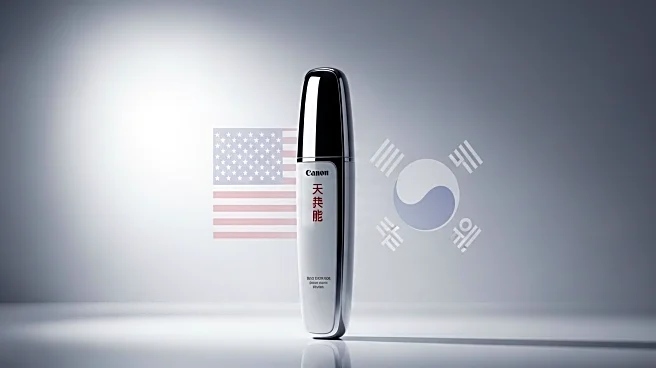What's Happening?
Mintel has released new data indicating a significant shift in the US skin care market, with Korean-made skin care products gaining ground. Since 2020, Korean skin care launches have increased by 20%, while US-manufactured product launches have decreased by 16%. This trend is attributed to changing consumer expectations and a widening innovation gap. Andrew McDougall, beauty and personal care research director at Mintel, notes that US brands have slowed innovation, focusing on fewer, larger launches, which has allowed Korean brands to thrive with consistent, advanced product development. Consumers are increasingly seeking science-backed, results-driven skin care experiences, rather than novelty. This shift has created opportunities for Korean brands to capture market share with frequent, innovative launches supported by strong storytelling and science-backed claims.
Why It's Important?
The shift in consumer preferences towards science-backed and results-driven skin care products is reshaping the competitive landscape in the US market. US brands face the risk of losing market share and consumer loyalty as shoppers seek more effective and exciting products. The success of Korean brands highlights the importance of agile development cycles, ingredient innovation, and consumer engagement strategies. US manufacturers can learn from K-Beauty's approach to maintain competitiveness. The concept of 'Gwang,' a radiant, healthy glow achieved through regular, layered skin care, is expected to influence US product strategies, emphasizing hydration, barrier repair, and radiance-boosting ingredients. This trend could lead to a shift in formulation priorities and marketing strategies, focusing on holistic skin health and long-term results.
What's Next?
US manufacturers and suppliers are advised to move faster, invest in R&D, and consider strategic partnerships with international innovators to stay competitive. Prioritizing science-backed formulations and advanced delivery technologies is crucial. Brands are encouraged to develop multi-step regimens and single-function products that can be easily incorporated into routines. Transparency around sourcing and sustainability, paired with strong storytelling and rapid feedback loops through social media, can give US brands an edge. Shortening innovation cycles and responding quickly to emerging trends will be essential for maintaining market relevance.
Beyond the Headlines
The rise of K-Beauty in the US market underscores the growing importance of ingredient transparency and clinical validation in consumer purchasing decisions. As consumers become more informed and discerning, brands that fail to adapt to these expectations may struggle to maintain loyalty. The emphasis on 'Gwang' and holistic skin health reflects a broader cultural shift towards wellness and self-care, which could influence other sectors of the beauty and personal care industry. This trend may also drive increased collaboration between US and international brands, fostering innovation and cross-cultural exchange.









